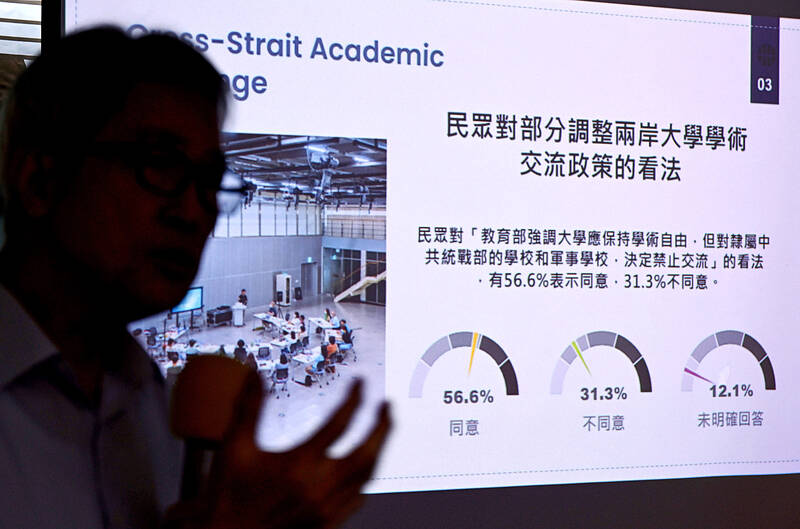Eighty-four percent of respondents said that educators should harbor the “correct national identity” to be allowed to teach, a poll released yesterday by the Professor Huang Kun-huei Education Foundation showed.
The survey showed that 58.6 percent of respondents supported the Ministry of Education’s efforts to include topics related to national identity in elementary and high-school curricula, foundation chairman Huang Kun-huei (黃昆輝) told a news conference in Taipei.
The poll showed 91.1 percent agreed that educators’ freedom of speech in the classroom is superseded by their responsibility to their students, Huang said.

Photo: Fang pin-chao, Taipei Times
Asked about a ministry ban on universities and colleges from interacting with institutions tied to the Chinese People’s Liberation Army or United Front Work Department, 56.6 percent of respondents were in favor of the policy, he said.
Foundation poll committee convener Kuo Sheng-yu (郭生玉) said a breakdown by region showed that 90 percent of respondents from the Yulin-Chiayi-Tainan region agreed that teachers should identify with Taiwan, topping all other major geographic areas in the nation.
The curriculum changes were supported by 62.3 percent of men, 66.2 of those in the Taipei-New Taipei City-Keelung region and 70.6 percent of those in the 20-to-34 age bracket, Kuo said.
The purpose of education is to cultivate modern people with an understanding of national identity and international perspectives, former deputy minister of examinations Lee Lung-sheng (李隆盛) said, citing the Fundamental Education Act (基本教育法).
Boosting national identity is necessary to promote Taiwanese solidarity and decrease the risk of an invasion, Lee said.
The survey results show that public opinion is in line with the legal responsibilities educators have, Lee said.
Most Taiwanese do not believe that freedom of speech entitles teachers to put themselves above national security or share their subjective political views with students, he added.
The poll showed that 87.6 percent of respondents agreed that the government should hasten efforts to develop an artificial intelligence (AI) education strategy.
It showed that 73.4 percent agreed with the ministry’s decision to stop demanding that elementary and high-schools teach subjects in English, excluding English-language classes.
The policies to improve AI and English-language education was well-intended, but education officials should be realistic about what teachers could achieve with the resources they have, Lee said.
The survey, which sought responses from Taiwanese aged 22 or older, was conducted from May 20 to 22 via landline.
It garnered 1,070 valid responses and had a margin of error of 3 percentage points.

Three Taiwanese airlines have prohibited passengers from packing Bluetooth earbuds and their charger cases in checked luggage. EVA Air and Uni Air said that Bluetooth earbuds and charger cases are categorized as portable electronic devices, which should be switched off if they are placed in checked luggage based on international aviation safety regulations. They must not be in standby or sleep mode. However, as charging would continue when earbuds are placed in the charger cases, which would contravene international aviation regulations, their cases must be carried as hand luggage, they said. Tigerair Taiwan said that earbud charger cases are equipped

Foreign travelers entering Taiwan on a short layover via Taiwan Taoyuan International Airport are receiving NT$600 gift vouchers from yesterday, the Tourism Administration said, adding that it hopes the incentive would boost tourism consumption at the airport. The program, which allows travelers holding non-Taiwan passports who enter the country during a layover of up to 24 hours to claim a voucher, aims to promote attractions at the airport, the agency said in a statement on Friday. To participate, travelers must sign up on the campaign Web site, the agency said. They can then present their passport and boarding pass for their connecting international

Taiwan sweltered through its hottest October on record, the Central Weather Administration (CWA) said yesterday, the latest in a string of global temperature records. The main island endured its highest average temperature since 1950, CWA forecaster Liu Pei-teng said. Temperatures the world over have soared in recent years as human-induced climate change contributes to ever more erratic weather patterns. Taiwan’s average temperature was 27.381°C as of Thursday, Liu said. Liu said the average could slip 0.1°C by the end of yesterday, but it would still be higher than the previous record of 27.009°C in 2016. "The temperature only started lowering around Oct. 18 or 19

WEATHER Typhoon forming: CWA A tropical depression is expected to form into a typhoon as early as today, the Central Weather Administration (CWA) said yesterday, adding that the storm’s path remains uncertain. Before the weekend, it would move toward the Philippines, the agency said. Some time around Monday next week, it might reach a turning point, either veering north toward waters east of Taiwan or continuing westward across the Philippines, the CWA said. Meanwhile, the eye of Typhoon Kalmaegi was 1,310km south-southeast of Oluanpi (鵝鑾鼻), Taiwan’s southernmost point, as of 2am yesterday, it said. The storm is forecast to move through central